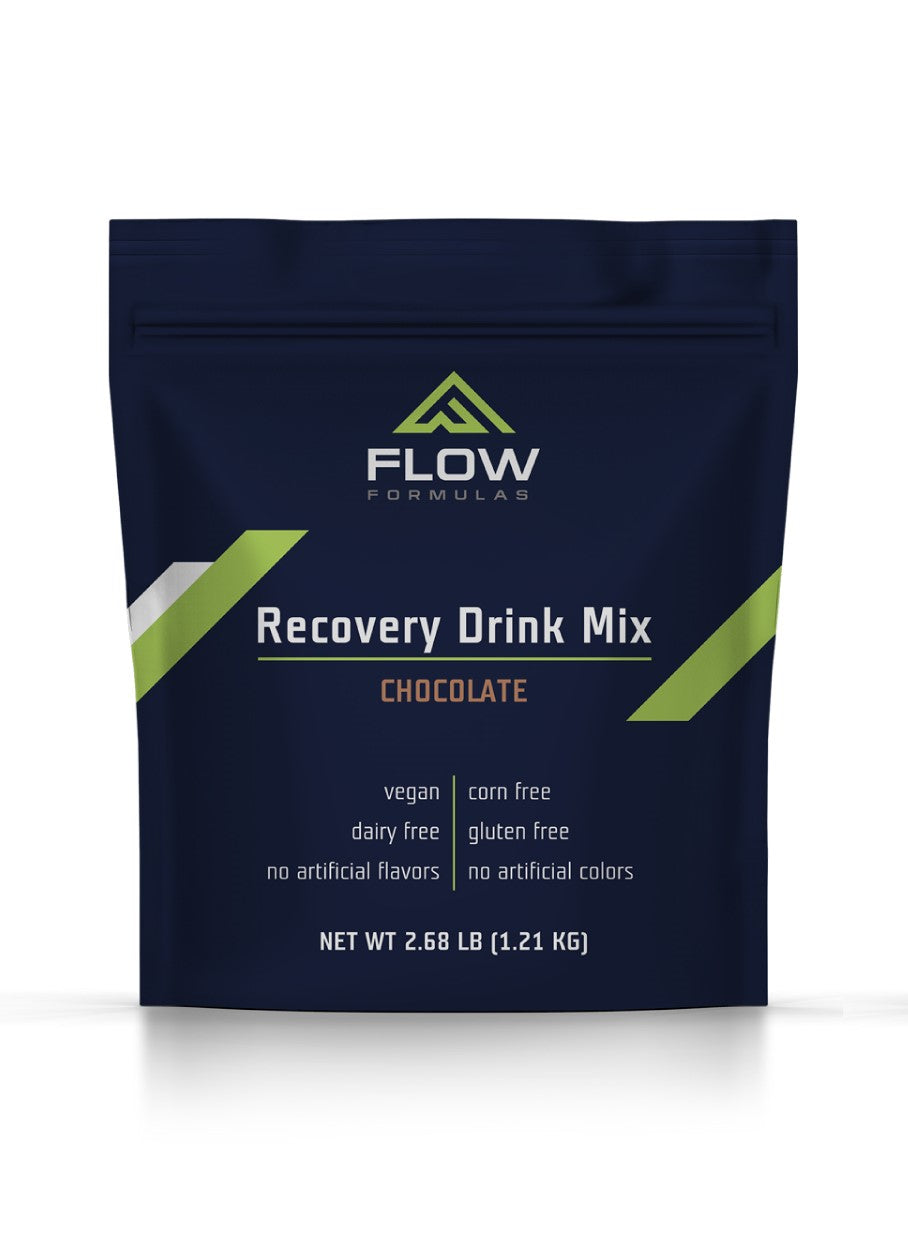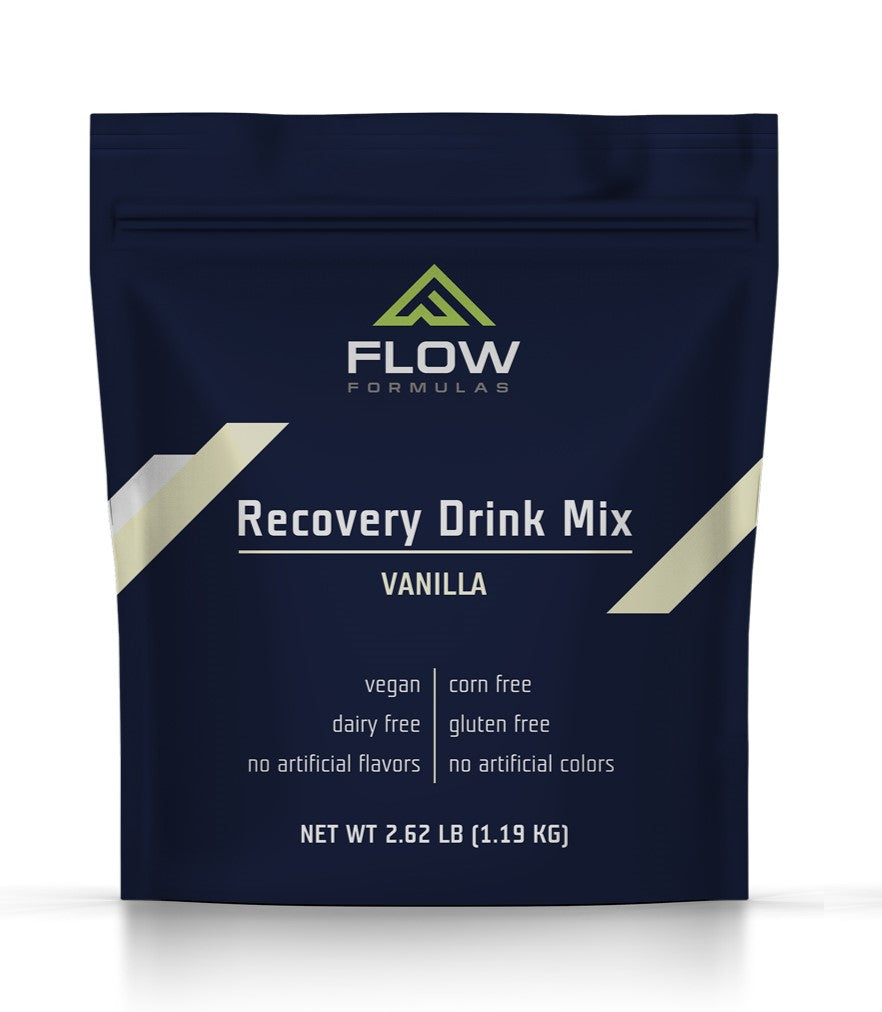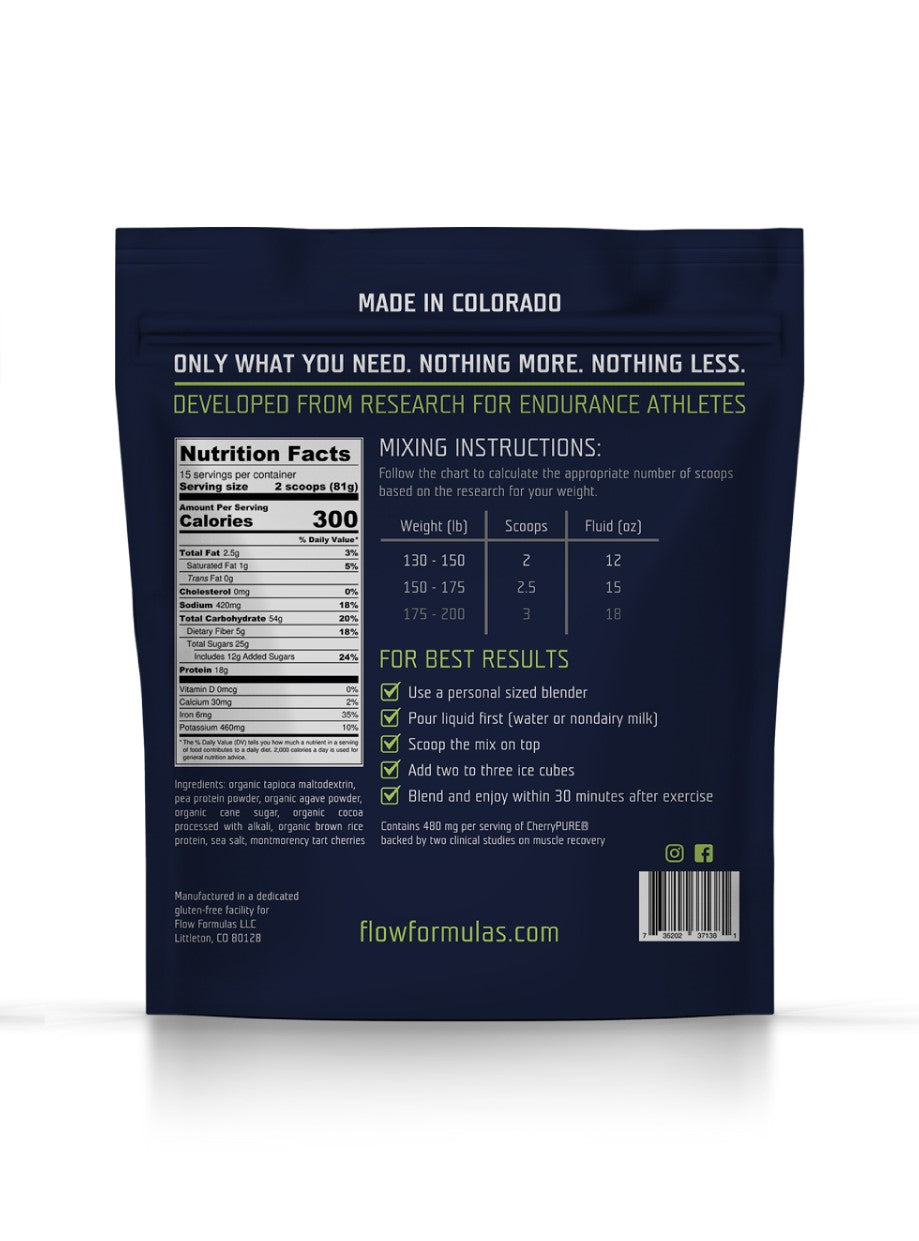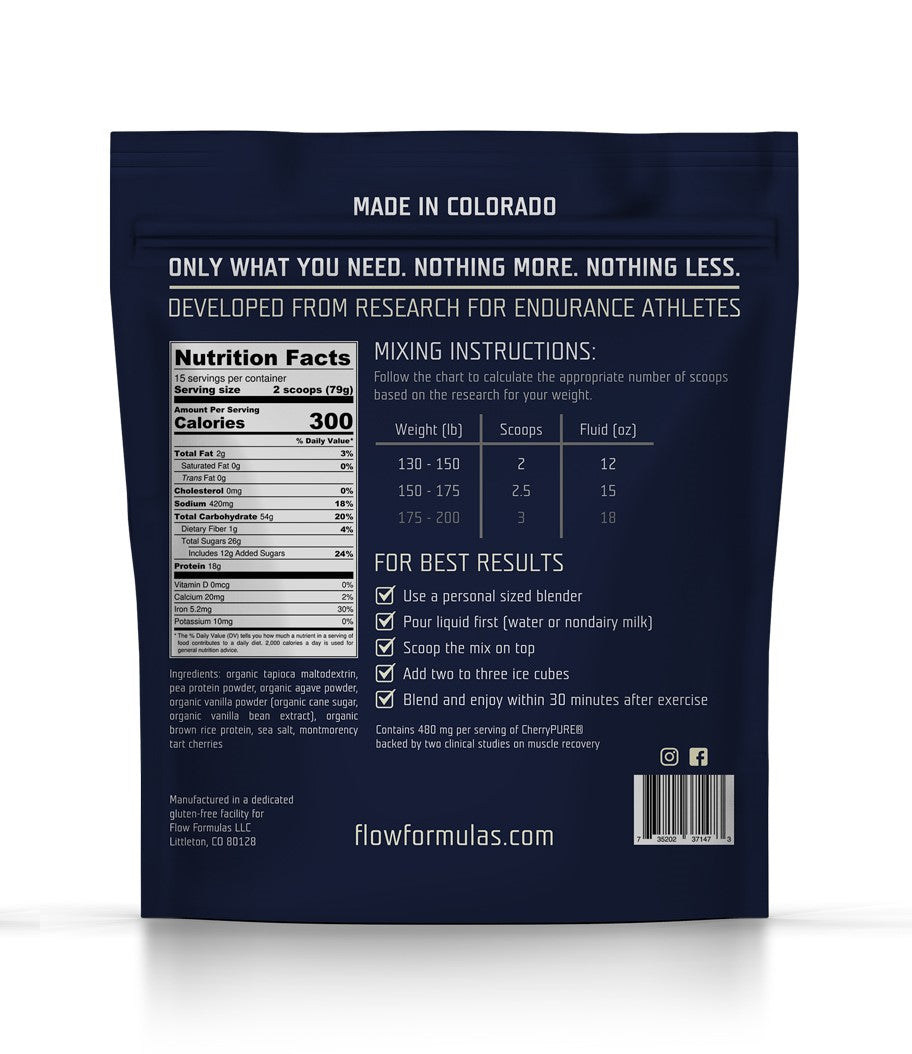Recovery Drink Mix
This recovery drink mix was designed from current research for endurance athletes to use within 30 minutes after exercise. It contains a ratio of carbohydrates and protein to maximum recovery for next day bouts of exercise.
- Developed from current sports performance research
- Replaces the most effective amount of carbohydrates post exercise
- Contains two types of carbohydrates to refuel muscle and liver glycogen
- Contains 480mg per serving of CherryPURE® backed by two clinical studies on muscle recovery
- Vegan and Top 12 allergen free
- Exceptional taste
Directions: Follow the chart to calculate the appropriate number of scoops based on the research for your weight.

For Best Results:
- Use a personal sized blender
- Pour liquid first (water or nondairy milk)
- Scoop the mix on top
- Add two to three ice cubes
- Blend and enjoy within 30 minutes after exercise
Ingredients:
Chocolate - organic tapioca maltodextrin, pea protein powder, organic agave powder, organic cane sugar, organic cocoa processed with alkali, organic brown rice protein, sea salt, montmorency tart cherries.
Vanilla - organic tapioca maltodextrin, pea protein powder, organic agave powder, organic vanilla powder (organic cane sugar, vanilla bean extract), organic brown rice protein, sea salt, montmorency tart cherries.
Frequently Asked Questions
For optimum recovery and maximum glycogen resynthesis, research shows endurance athletes should consume 1.2 grams of carbohydrates per kilogram of body weight per hour, for subsequent hours after exercise when quick recovery between bouts is required. [1] Using a combination of 0.8 grams of carbohydrates and 0.3 - 0.4 grams of protein shows similar glycogen uptake and may have more recovery benefits for higher intensity efforts or more muscle damaging activities such as running. Consuming less than 0.8 grams per kilogram of body weight clearly shows reduced restoration of muscle glycogen. [2] Therefore, our recovery drink mix contains 0.9 grams of carbohydrates with an additional 0.3 grams of protein per kilogram of body weight to ensure an adequate amount of carbohydrates and the addition of protein to reduce perception of soreness while maintaining the same amount of glycogen resynthesis as a carbohydrate only beverage. [3]
- Alghannam, A., Gonzalez, J., & Betts, J. (2018). Restoration of Muscle Glycogen and Functional Capacity: Role of Post-Exercise Carbohydrate and Protein Co-Ingestion. Nutrients, 10(2), 253.
- Vitale, K., & Getzin, A. (2019). Nutrition and Supplement Update for the Endurance Athlete: Review and Recommendations. Nutrients, 11(6), 1289.
- Pasiakos, S. M., Lieberman, H. R., & McLellan, T. M. (2014). Effects of Protein Supplements on Muscle Damage, Soreness and Recovery of Muscle Function and Physical Performance: A Systematic Review. Sports Medicine, 44(5), 655–670.
Research shows adding protein to carbohydrates post exercise does not improve next day performance but may reduce muscle soreness. [1-2] Newer research suggests that additional protein may have a delayed response in recovery showing improvement after 60 hours. [3]
- Millard-Stafford, M., Warren, G. L., Thomas, L. M., Doyle, J. A., Snow, T., & Hitchcock, K. (2005). Recovery from Run Training: Efficacy of a Carbohydrate-Protein Beverage? International Journal of Sport Nutrition and Exercise Metabolism, 15(6), 610–624.
- Pasiakos, S. M., Lieberman, H. R., & McLellan, T. M. (2014). Effects of Protein Supplements on Muscle Damage, Soreness and Recovery of Muscle Function and Physical Performance: A Systematic Review. Sports Medicine, 44(5), 655–670.
- Protein Supplementation During or Following a Marathon Run Influences Post-Exercise Recovery. (2018). Nutrients, 10(3), 333.
The Recovery Drink Mix contains both glucose and fructose as this combination restores both muscle and liver glycogen. [1-3] The addition of fructose does not appear to improve muscle glycogen synthesis rate, however adding fructose versus glucose only improves short term recovery for faster next day performances while also decreasing gastrointestinal distress. [4-7]
- Ivy, J. (1998). Glycogen Resynthesis After Exercise: Effect of Carbohydrate Intake. International Journal of Sports Medicine, 19(S 2), S142–S145.
- Décombaz, J., Jentjens, R., Ith, M., Scheurer, E., Buehler, T., Jeukendrup, A., & Boesch, C. (2011). Fructose and Galactose Enhance Post-Exercise Human Liver Glycogen Synthesis. Medicine & Science in Sports & Exercise, 43(10), 1964–1971.
- Alghannam, A., Gonzalez, J., & Betts, J. (2018). Restoration of Muscle Glycogen and Functional Capacity: Role of Post-Exercise Carbohydrate and Protein Co-Ingestion. Nutrients, 10(2), 253.
- Trommelen, J., Beelen, M., Pinckaers, P., Senden, J., Cermak, N., & Van Loon, L. (2016). Fructose Coingestion Does Not Accelerate Postexercise Muscle Glycogen Repletion. Medicine & Science in Sports & Exercise, 48(5), 907–912.
- Gonzalez, J., Fuchs, C., Betts, J., & van Loon, L. (2017). Glucose Plus Fructose Ingestion for Post-Exercise Recovery—Greater than the Sum of Its Parts? Nutrients, 9(4), 344.
- Maunder, E. D., Podlogar, T., & Wallis, G. A. (2018). Postexercise Fructose–Maltodextrin Ingestion Enhances Subsequent Endurance Capacity. Medicine & Science in Sports & Exercise, 50(5), 1039–1045.
- Gray, E. A., Green, T. A., Betts, J. A., & Gonzalez, J. T. (2020). Postexercise Glucose–Fructose Coingestion Augments Cycling Capacity During Short-Term and Overnight Recovery From Exhaustive Exercise, Compared With Isocaloric Glucose. International Journal of Sport Nutrition and Exercise Metabolism, 30(1), 54–61.
Tart cherry powder has been shown to speed up recovery by reducing inflammation, muscle soreness, and oxidative stress thereby increasing performance. [1-4] Our recovery drink mix contains 480mg per serving of CherryPURE® backed by two clinical studies on muscle recovery. [1, 5]
- Levers, K., Dalton, R., Galvan, E., O’Connor, A., Goodenough, C., Simbo, S., Mertens-Talcott, S. U., Rasmussen, C., Greenwood, M., Riechman, S., Crouse, S., & Kreider, R. B. (2016). Effects of powdered Montmorency tart cherry supplementation on acute endurance exercise performance in aerobically trained individuals. Journal of the International Society of Sports Nutrition, 13(1), 1–23.
- Howatson, G., McHugh, M. P., Hill, J. A., Brouner, J., Jewell, A. P., Van Someren, K. A., Shave, R. E., & Howatson, S. A. (2009). Influence of tart cherry juice on indices of recovery following marathon running. Scandinavian Journal of Medicine & Science in Sports, 20(6), 843–852.
- Kelley, D., Adkins, Y., & Laugero, K. (2018). A Review of the Health Benefits of Cherries. Nutrients, 10(3), 368.
- Gao, R., & Chilibeck, P. D. (2020). Effect of Tart Cherry Concentrate on Endurance Exercise Performance: A Meta-analysis. Journal of the American College of Nutrition, 39(7), 657–664.
- Levers, K., Dalton, R., Galvan, E., Goodenough, C., O’Connor, A., Simbo, S., Barringer, N., Mertens-Talcott, S. U., Rasmussen, C., Greenwood, M., Riechman, S., Crouse, S., & Kreider, R. B. (2015). Effects of powdered Montmorency tart cherry supplementation on an acute bout of intense lower body strength exercise in resistance trained males. Journal of the International Society of Sports Nutrition, 12(1), 1–23.
Hydration after endurance exercise is crucial for next day training. Research shows water only, is not an effective way to hydrate, and sodium is required in order to replete fluid loss. [1-3] Even consuming two times the amount of fluid loss with inadequate sodium will not restore hydration. Instead it increases urine output. In order to restore fluid balance, studies show one should consume 150% of fluid loss with an additional 35-68 milligrams (52mmol/L - 100mmol/L) of sodium per ounce of fluid. [4, 5] This equates to 420 milligrams of sodium for a 12 ounce beverage.
- González-Alonso, J., Heaps, C., & Coyle, E. (1992). Rehydration after Exercise with Common Beverages and Water. International Journal of Sports Medicine, 13(05), 399–406.
- Wong, S. H., & Chen, Y. (2011). Effect Of Carbohydrate-electrolyte Beverage, Lemon Tea, Or Water On Rehydration During Short-term Recovery From Exercise. International Journal of Sport Nutrition and Exercise Metabolism, 21(4), 300–310.
- Jeukendrup, A. E., Jentjens, R. L. P. G., & Moseley, L. (2005). Nutritional Considerations in Triathlon. Sports Medicine, 35(2), 163–181.
- Shirreffs, S. M., Taylor, A. J., Leiper, J. B., & Maughan, R. J. (1996). Post-exercise rehydration in man: effects of volume consumed and drink sodium content. Medicine & Science in Sports & Exercise, 28(10), 1260–1271.
- Mitchell, J. B., Grandjean, P. W., Pizza, F. X., Starling, R. D., & Holtz, R. W. (1994). The effect of volume ingested on rehydration and gastric emptying following exercise-induced dehydration. Medicine & Science in Sports & Exercise, 26(9), 1135-1143.
The recovery drink mix should be consumed within 30 minutes after endurance exercise. This is the window in which glycogen resynthesis is the highest. [1-2]
- Spaccarotella, K. J., & Andzel, W. D. (2011). Building a Beverage for Recovery From Endurance Activity: A Review. Journal of Strength and Conditioning Research, 25(11), 3198–3204.
- Alghannam, A., Gonzalez, J., & Betts, J. (2018). Restoration of Muscle Glycogen and Functional Capacity: Role of Post-Exercise Carbohydrate and Protein Co-Ingestion. Nutrients, 10(2), 253.
Follow the chart below to calculate the appropriate number of scoops based on the research for your weight.

For best flavor and texture we recommend mixing in a blender. Pour the appropriate amount of water or low calorie nondairy milk from the chart above into the blender. Add the recovery drink mix on top with an additional two to three ice cubes. Blend for 30-60 seconds. Pour and enjoy.
While Flow Formula's does not have a kosher certification all of our ingredients have a kosher certificate.




